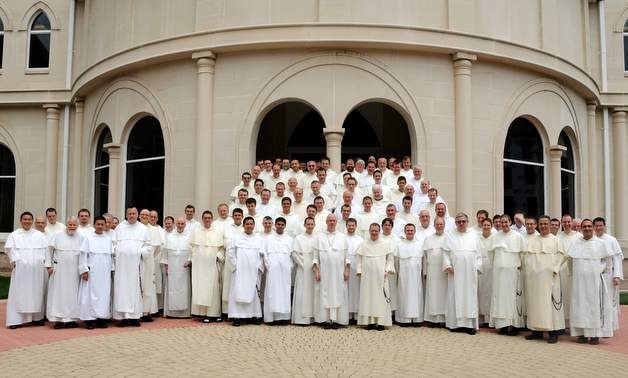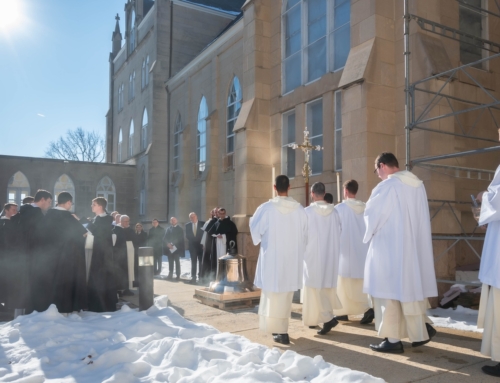It’s not so unusual for Dominicans from other provinces to stop by the House of Studies. Perhaps they come to give a talk here or somewhere else in Washington. Sometimes there are official meetings that draw them to our house. Occasionally they are simply passing through and want to stay with their brethren. There are usually even a few who live in the house for an extended period.
Despite differences in culture and custom that separate us, we are all sons of St. Dominic, and it is a great joy to receive these guests and to learn about the life and work of the order outside the Province of St. Joseph. Still, life in the house pretty much goes on apace, and the guests simply slip into the flow of things as their schedule allows.
This week has been a bit different. The House of Studies has been taken over by a host of friars from all over the world for a Dominican conference on Thomism. With most of the student brothers dispersed around the province for summer ministry, a small contingent of priests and student brothers were left to play host to this esteemed and accomplished group of guests. Becoming outnumbered by our brethren from around the world has provided an interesting perspective on the universality of our order and of our province’s place in it.
I’ve often found myself speaking with pride about being part of a religious order with nearly eight hundred years of tradition behind it, but sometimes it feels a bit false to speak in such terms. How connected can the work of the first few American friars in the backwoods of Kentucky 208 years ago really be to the great tradition of medieval mendicancy? Granted, for a country that just celebrated its 237th birthday, our two centuries of tradition are impressive, but in the life of the Church we are rather new on the scene.
This is one of the great gifts that this week of living, eating, conversing, and praying with such a diverse group of Dominicans has provided. Whatever insecurity one might harbor due to the particular history of our province, its inauspicious beginnings, and the ocean that separated it from the lifeblood of its heritage, it was comforting to experience a piece of the unity that our profession of vows affords, always and everywhere made to God, to blessed Mary, to blessed Dominic, and to the Master of the Order. Some of the visiting friars come from provinces that have almost eight hundred years of continuous Dominican tradition, including the Province of Toulouse in the south of France, where St. Dominic first founded the order. Others come from provinces younger than ours, including some that are daughter provinces of the Province of St. Joseph.
While conversations in more than half a dozen different languages took place in our refectory and halls, the ones I could understand usually gravitated to the same sorts of topics you would hear at the House of Studies any other day of the year. There are the hilarious stories of eccentric brethren and moving depictions of holy ones, often one and the same friar. They shared proud stories of engaging apostolates and concerning tales of a culture in decline. There is a shared love of the Gospel, of the Church, and of the Truth, and an ardent desire to share all of them with a hurting world. And especially at this conference there is the engaging conversation of friars enthralled by the tradition of St. Thomas Aquinas and the example he provided, not to mention a willingness to argue over what exactly that tradition means and the best way to present it to the world.
As hosts this week, which happens to include the Fourth of July with all its patriotic glory, there was no shortage of American pride on display, most notably in subjecting our international brethren to two good old-fashioned American cookouts with everything from hamburgers and hot dogs to barbecued ribs and fried okra. But, as fun as these and other social gatherings were, perhaps the most moving events this week were simply the liturgies prayed in common, most especially Compline. While, for many of the friars, praying the office in English is probably quite unfamiliar, it has been very moving to look up and see so many of them singing by heart the Latin chants that form our common heritage. Despite spending the week playing host, these moments of common prayer helped solidify for me the notion that our province is more than just a guest in this venerable eight hundred-year tradition.
✠
Image: Dominicans and the Renewal of Thomism conference; July 4, 2013; Washington, D.C.







